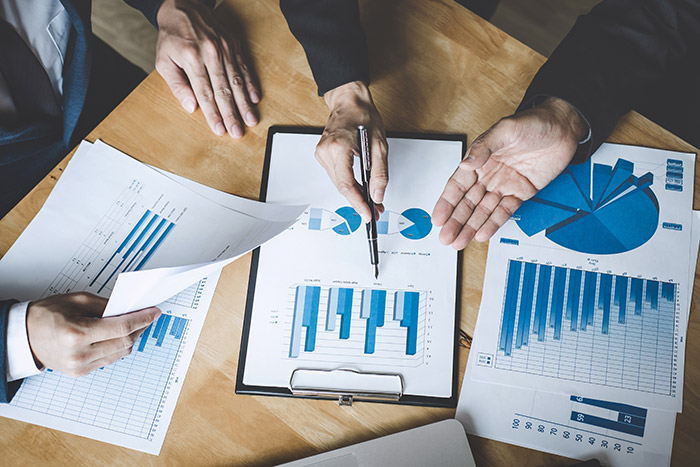A business credit score is a score given to a company based on a set of criteria to determine how creditworthy they are to potential customers, suppliers, and partners.
It can be a very strong indicator of how well the business is performing financially as it is derived from factors within the business accounts, such as its balance sheet and cash flow, amongst other things. Like personal credit scores, a variety of different factors are taken into account and analysed to create and append a credit score to a business. Business credit scores are predicted by credit reference agencies and each has their own algorithm when conducting calculations, this is how they sometimes differ from company to company.

With Creditsafe, a business credit score can be found within a company credit report, along with the key financials and other information that is analysed to create it. The business score determines the likelihood of a company becoming insolvent in the next 12 months, with 0 being very likely and 100 being very unlikely. The higher the business score, the more stable the company is.
Companies can run a business check on any other companies that they want to do business with by pulling a company credit report, and within this company credit report, you will find a business credit score.
How can I find my business credit score?
You can find your business credit score if you run a business check via a credit reference agency. If you do this with Creditsafe, you can view a company credit report for free.
A company credit report has detailed information regarding a company, whether it be your own or a business you are thinking to trade or partner with. It can give you an insight into what their financials are, who the director is, how they pay their bills, plus much more.
A company credit report will give you information on:
Business details
Every company credit report will state the business name, address, company number, incorporation date and have an SIC description, (which places the company into a sector based on its principle activity stated at Companies House). It will also have a website address and telephone number where applicable. Copies of original documents filed at Companies House are also available for verification.
Key financials
The key financials of a company are also displayed on a company credit report when the company is obliged to file its accounts. This information includes profit & loss statement, the balance sheet, capital and reserves, cash flow and other financial items. It will also include ratios such as creditor and debtor days, pre-tax profit margins and so on. These are all taken into account when determining the business score, however, the information is there for the viewer with an eye for numbers to delve deeper if they so wish.

Adverse information (such as CCJs)
A Creditsafe company credit report will also show you any adverse information regarding your company, such as County Court Judgments (CCJs). A CCJ is where the company in question has failed to pay an invoice to another and has been taken to court to have the debt paid.
How long a CCJ will last on the report depends on how quickly the company the CCJ was filed against takes action. For example, if the CCJ is paid or successfully disputed within 30 days, it will be removed from the file. However, if it is paid late or not at all, it will either show as outstanding or settled on the company credit report for six years.
Trade Payment information
Trade payment information from Creditsafe’s Trade Payment Programme can give anyone viewing a company credit report insight into a company’s payment behaviour. Depending on how much information is held on that company’s invoices, you can see how many invoices are outstanding and how many have been paid. It will also show you the average invoice value for this company, and how many days on average it takes them to pay their invoices. The report can also show you trends over the past year on how invoices have been paid and can create a benchmark against other companies in that region, industry or the UK as a whole.
Director Details
A Creditsafe company report will also give you Director and Shareholder details. This includes the name, date of birth and latest address of all the directors and shareholders within that company. It will also tell you their nationality and if they have any links to other companies past and present, such as directorships within failed businesses.
The Creditsafe system also allows you to click through to individual directors reports, stating all the information and history that has been filed about them.
Why should I run a business check?
Running a business check is part of financial due diligence before doing business with someone else. Knowing your customer has never been more important as businesses all over the world continue to struggle with scams and late payments. By running a business check, you are mitigating the financial risk associated with extending credit.
Here are some reasons why you need to run a business check:
Fraud is a real issue that needs to be tackled.
Before doing business with any company, you should always check they are legitimate. This does not mean just checking their website and telephone number works; every company will have a company number, and if it’s a limited business it would have registered at Companies House. You can view scanned copies of Companies House documents to verify a business and check the directors match up to who you’re dealing with face to face.
Being paid late could be the end of your business.
According to national statistics, late payments are on the rise. The UK government has even introduced a ‘Prompt Payment Policy’ for UK businesses, with a ‘practical focus on actions that support smaller businesses’. Give your business the best chance by doing your due diligence and viewing a company’s payment behaviour before you start doing business with them. This should be a vital part of your credit control system.
Losing a supplier could cost you your business.
It’s not just potential customers you need to run a business check on, it’s also upwards of the supply chain. If your business relies on supplies to be able to operate, you need to check your suppliers are financially sound and aren’t going to collapse on you. If you lose a supplier, it would leave you with no way to continue to run your business and have a knock-on effect on your customers.
You can see a true representation of what potential clients think of you.
Running a business check on your own company can help you see what potential customers and suppliers see when you’re pitching for new business. You can ensure you are doing everything possible to get your business score above your competitors and maintaining creditworthiness.
Understand payment behaviours.
If a company has a good reputation and lots of business coming in, it may seem like a huge win if you manage to take them on as a client or partner. However, you still need to understand their payment behaviour. What if they paid their bills on average 20 days late every month? That could have a damaging effect on your cashflow and something you need to analyse before signing any contracts.